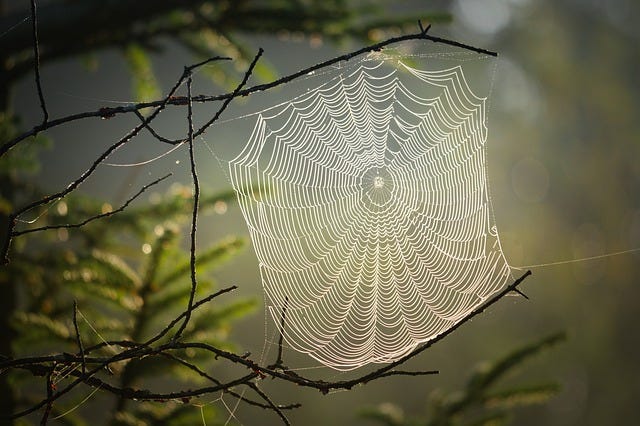Creating The Webbd Wheel: Empathy
Oxford Online Dictionary defines empathy as “the ability to understand and share the feelings of another.” Most of us think of empathy as a desirable trait, and these days claiming empathy signals virtue as never before. Too bad claiming empathy doesn’t mean we have or practice it.
In post #52 of The Hanged Man, both Radulf and Kunik have an opportunity to see the viewpoints of people close to them, not only as an act of imagination, but as a magical reality. More importantly, however, they are brought face to face with their deepest fears, hidden anguish, and strength, forcing empathy with themselves.
I have long believed if we desire a world built upon tolerance, respect, empathy, kindness, and so many other foundational behaviors, we must begin with ourselves. We must see ourselves clearly and accept ourselves. We must understand our wounds and our choices. We must empathize with our own experience.
To cultivate empathy is to open ourselves fully to the pain of another. Empathy is expensive; one can’t look away or pretend not to know. Callouses on our hearts and souls are rubbed away. We are brought face to face with the pain and wounds of humanity.
Feelings are overwhelming; our own can feel unmanageable, let alone those of others. It seems easier to stand at a distance and refrain from imagining what it is to live in another’s shoes. It seems easier to bury our own pain and pretend it isn’t there.
The Ostara initiation demands the characters face themselves, face their history, face their choices and understand consequences arising from those choices. It’s gritty work. It’s also redemptive. Rumplestiltskin finds guidance. Radulf confronts his own desperation and hidden truths. Kunik is faced with a choice which will shape the rest of his life. They each have an experience of intense and inescapable empathy for themselves and others.
Weaving Webs
Substack is a huge community, growing larger every day. I’m sure I’ve only seen a small fraction of what it has to offer. I subscribe to many writers here, and discover more every week. It’s a perfect playground for someone like me. I’m enlightened, inspired, amused, provoked, and awed by turn. Writing does not happen in a vacuum. To be a writer is to live, work, and play in a giant compost pile where nothing is ever wasted or lost. Everything I read, experience, and explore makes my writing stronger, and I’m vividly aware of how essential connection, in all its magical and powerful complexity, is to living vibrantly and creatively.
If we never develop or lose our ability to empathize, we become blind to the web of life supporting us and around us. We lose track of the ‘we’ and move into the cul-de-sac of ‘us’ and ‘them.’ We hurt ourselves and tear the web of connection.
However, empathy is tricky. If we want others to empathize with us, we must reveal ourselves; we must practice authenticity. For many, this is a risky business. We all know people who turn our vulnerabilities and fears against us. Some marginalized groups have experienced so much betrayal, violence, injustice, and hatred they can’t afford to assess whether a hand held out to them is friendly and well-intentioned or dangerous. I have encountered this myself in asking questions as I try to understand another’s point of view. Being met with “it’s not my job to educate you,” while trying to make a connection is hurtful, and I, in my turn, lose trust and withdraw back into my introverted shell. I understand this defensiveness arises out of an experience of chronic hurt and injustice, but it doesn’t help me figure out how to become an ally. However, some brave people continue to speak and write, in spite of how often they’re met with hate, and they enlarge my own compassion and understanding. Their courage inspires me.
This week I’d like to recommend two newsletters I follow, both of which have helped me understand points of view very different from my own and strengthened my ability to empathize:
Lucy, a journalist, writes
, a newsletter about living with disability. Her honesty about the challenges she faces is humbling and touching. Because of her I have insight into an experience of disability I could never imagine.Sharon Hurley Hall writes
, an intelligent, well-written, dynamic publication filled with tools, resources, and interesting interviews. Sharon's courage and directness, along with her willingness to write honestly about her experience as a Black woman, are inspiring and informative.This morning, as I was drafting this post and reading my email, I found a Hanukkah story from another Substack writer I follow, Michael Estrin of
. It made me smile, and it also made me realize afresh how ubiquitous Christmas is this time of year, though many of us follow other winter holiday traditions of ritual, music, games, and food. I myself celebrate Yule, not Christmas. Nobody gets a day off on Yule, few people are familiar with the traditional Celtic Yuletide music, and I light candles and engage with ritual and prayer alone. Michael's sweet short story taught me things I never knew before about Hanukkah, and that’s a shame. Presumably those who celebrate Hanukah find it as meaningful as I find Yule, or others find Christmas. It seems to me there’s room for all midwinter celebrations, as well as opportunities for us to share and learn about one another’s spiritual frameworks.But we can’t do that from a place of guarded inauthenticity.
Turning Over Stones
I’ve been pausing for the last couple of weeks, and I realize I’m ready to make changes, both in my writing practice and in other parts of my life. I’ve been on Substack for a year now, and this is my 52nd post. It’s hard to believe. I’ve loved being on this platform and it’s been a privilege to interact with some wonderful writers. I’m the kind of person who sits in the corner for a long time in a new environment, listening, watching, reading, and staying invisible. I’ve gradually started liking posts and commenting on them. I’ve played around with Substack’s tools and tips and learned from other writers. I’ve thought about my own weaknesses and fears as a writer and as a person.
I’ve enjoyed writing about writing. I have no close personal friends who are writers, so the essays accompanying my serial fiction have been a welcome opportunity to speak with other writers about the strange alchemy of the process. However, I’ve done that without coming out of the shadows as a real person, revealing only the writing part of my life. But every writer knows it’s the messy, stinky, imperfectly buried parts of ourselves and our lives (the compost pile) that feed our writing. Several people I follow on Substack have inspired me to risk authenticity, actively solicit comments, and be more proactive about engaging in this community where I’m beginning to feel at home.
Hence, a few changes to this part of my weekly posts, including this new ‘Turning Over Stones’ section for provocative (I hope) questions. Some readers here have come from my blog, Harvesting Stones. Others have come to me from Substack. However you found me, thank you for being here. I’d like to know more about you. Please introduce yourself in the comments. If you’re on Substack or have a blog or other site, include a link to your page(s) so we can visit you.
Questions:
On a scale of 1 (very little) to 10 (more than is comfortable), how much empathy do you have? Do you feel your lack or abundance of empathy is problematic?
Have you ever attempted to understand another point of view and felt painfully rebuffed?
Does the idea of learning to be an ally to someone in a marginalized group make you feel uncomfortable? Can you talk about your discomfort? (I might do/say the wrong thing, it’s impossible to make a connection with someone so different than I am, why should I be supportive -- nobody does that for me, I feel guilty, I’ll betray my own identity if I do so, I’m scared to speak up for another, what would my friends/family think of me, I’m not a bigot or interested in learning more)?
Can you recommend other Substack newsletters that have helped you understand people different from yourself?





Hi Jennifer - I somehow missed this at the time but thanks so much for featuring my newsletter; I'm so glad you enjoy it. Happy New Year
You're welcome. I appreciate your contribution very much! Thank you for being willing to help me understand how to make a positive difference.